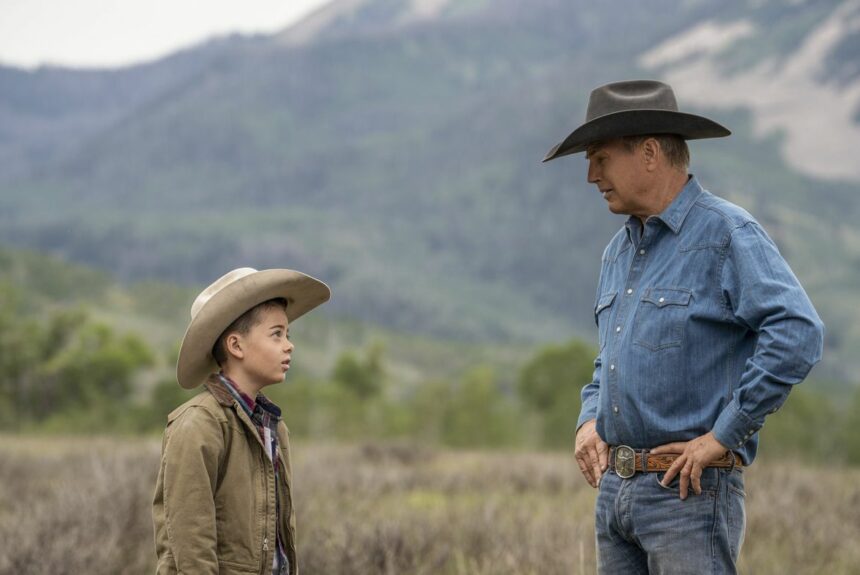Yellowstone creator Taylor Sheridan insists his show isn’t a “red state show” but don’t tell that to Rep. Dan Crenshaw (R-TX) who says Yellowstone “perfectly captures the hypocrisy of the ‘environmentalists.’”
In a recent Instagram post, Crenshaw shares a scene in which the show’s lead character, Governor John Dutton played by Kevin Costner, dresses down his environmental advisor, Stanley, for assuming that a ban on natural gas exploration would help preserve habitat for the sage grouse, a bird that is “near threatened” in states like Montana.
>>>READ: Don’t Look Left: Hollywood’s Climate Satirists Need a Broader Coalition
Here’s the clip and the key exchange:
Stanley: There’s empirical evidence that gas exploration and extraction have a negative impact on the sage grouse environment.
John Dutton: And what effect you think 7,000 acres of solar panels are going to have on their environment?
Stanley: There’s no evidence that solar panels would have any impact on the sage grouse environment.
John Dutton: What do they do with the sagebrush when they put in the solar panels?
Stanley: They, they, they would clear it before putting in the solar panels.
John Dutton: And remove the sagebrush?
Stanley: Yes sir.
John Dutton: Sage Grouse live in the sagebrush.
Stanley: They do.
John Dutton: And you don’t think removing the sagebrush is gonna have an effect on the population?
Stanley: I just said there’s no evidence…
John Dutton: You know what scares me about you, Stanley? You’re serious.
The last line is the kicker. What drives red-state Americans crazy is the presumption that left-wing environmentalists have a monopoly on seriousness and caring when their policies don’t add up. In real life, conservatives see “Stanley” everywhere, from a “green” German government that outsourced its CO2 emissions to Russia to the Biden Administration that is asking Saudi Arabia to produce more fossil fuels while telling American producers to produce less.
Still, Sheridan has a point. His characters don’t easily fit into any ideological box. In other scenes, Dutton wonders if we’ll survive another 100 years because of our careless stewardship and pardons a character who is serving a long prison sentence for eco-terrorism so she can serve as his environmental advisor. Oh, and in a previous episode, Dutton had a fling with the eco-terrorist.
In a recent interview Sheridan said, “They refer to it as ‘the conservative show’ or ‘the Republican show’ or ‘the red-state Game of Thrones. And I just sit back laughing. I’m like, ‘Really?’”
He continues, “The show’s talking about the displacement of Native Americans and the way Native American women were treated and about corporate greed and the gentrification of the West, and land-grabbing. That’s a red-state show?”
Still, conservatives are going to continue to love Yellowstone because it at least acknowledges that there are two sides to the story. Smart artists know that their job isn’t to provide the right answers but to create relatable characters that ask the right questions, or at least questions people in the real-world care about. That’s why Yellowstone is a phenomenon.
Yellowstone has popularized issues like property rights, land management and conservation like no other show. The Property and Environment Research Center (PERC) devoted an entire issue of their news magazine to the issues raised by Yellowstone.
Those issues matter a lot to America’s farmers and ranchers. I live on a 62-acre farm in Pleasant Valley, Maryland, a picturesque ten-mile-long valley between South Mountain and Elk Ridge near Harpers Ferry and Antietam. The founder of my farm, Captain Hezekiah Boteler, a veteran of the War of 1812, and his descendants saw their farm dwindle over the years from the encroachment of the state and developers. They fought mightily to keep their farm in their family and did for 160 years. Their battles are now my battles, and the battles of my neighbors.
>>>READ: American Prairie Shows How the Free Market is Conserving our Natural Environment
Thankfully, developers don’t want to build an airport in my valley like they do in Yellowstone but there is an effort to carve up the valley’s farmland with a bike path on an old rail line the state should have given back to property owners. Anyone who has watched Yellowstone will have no doubt about which side John Dutton would pick.
The show also makes it clear that property rights means property responsibility. This ethic is the norm, not the exception, in red-state America. Caring for “my land” means being aware of how my decisions affect my neighbor’s land and future generations. What I put in my stream affects my neighbor downstream, and there is always someone upstream. Some of Yellowstone’s best scenes depict Dutton enforcing this ethics in very colorful – and brutal – ways (Hint: Google “Yellowstone rattlesnake cooler”).
Good shows entertain. Great shows resonate. Yellowstone would have to go very “woke” to turn off red-state Americans. Yellowstone asks viewers to imagine not just an America that was, but an America that could be. That dream deserves a chance to succeed in not just red states, but all states.
The views and opinions expressed are those of the author’s and do not necessarily reflect the official policy or position of C3.
